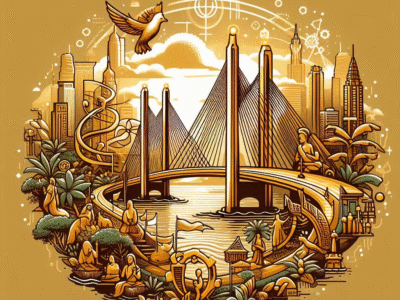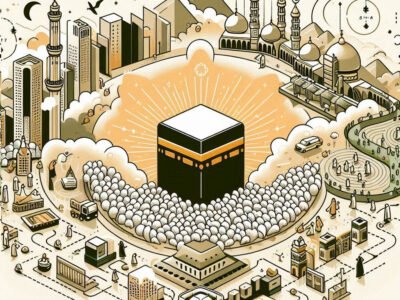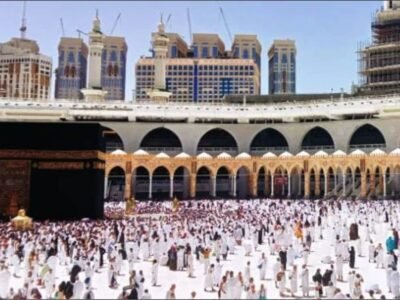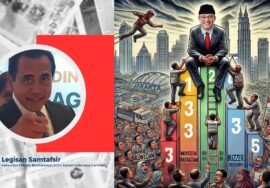Hajj: From Ritual to Life Transformation
By Legisan Samtafsir
(Founder of the Indonesia Mabrur Movement)
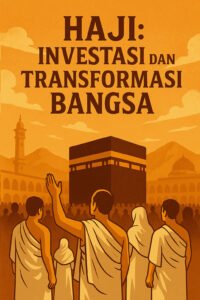 Islam is often narrowly understood as a set of worship rituals. In truth, every Islamic ritual holds deeper meanings that can be explored and applied across life’s various domains, including profession and work. One such ritual with profound significance is Hajj. But have we truly understood Hajj beyond its rituals—as a force that shapes mindset, character, and drives social transformation?
Islam is often narrowly understood as a set of worship rituals. In truth, every Islamic ritual holds deeper meanings that can be explored and applied across life’s various domains, including profession and work. One such ritual with profound significance is Hajj. But have we truly understood Hajj beyond its rituals—as a force that shapes mindset, character, and drives social transformation?
In practice, Hajj is often viewed merely as a sequence of religious rites to be completed according to Islamic law. However, upon closer inspection, each element of Hajj holds philosophical meaning that can be integrated into professional and organizational life. For example, wearing the ihram is not merely donning white cloth in the Holy Land and following its rules—it is a declaration of servitude to Allah, a shedding of arrogance and luxury, and a training in humility, equality, authenticity, and deep spiritual awareness. These principles apply directly to professional life, encouraging sincerity, humility, gratitude, transparency, and decision-making grounded in noble values.
Likewise, the stay at Arafat (wuquf) represents the acknowledgment of one’s status as a vicegerent (khalifah) of Allah. Applied to daily life, it can serve as a foundation for professionals to carry out responsibilities with integrity, craft grand missions and visions (BFF: Backward From Future & Roadmap), and make decisions rooted in prophetic leadership. Other rites—overnight stay in Muzdalifah, stoning at Mina, tawaf, sa’i between Safa and Marwah, shaving (tahallul), and visiting historic sites in Makkah and Madinah—all have life and professional implications.
Maqbul and Mabrur
Many feel satisfied once they’ve completed the rituals of Hajj according to the rules (maqbul: accepted). But has it reached the level of mabrur? A mabrur Hajj is not just about legal compliance but is marked by real-life impact. The spiritual strength acquired should manifest in daily life—through resilience, strong determination, a sense of responsibility, and readiness to fulfill life’s duties and social roles toward the greater good.
Indeed, the struggle after returning from Hajj is often harder than the rituals themselves. While in Hajj one practices patience and discipline, post-Hajj life presents more complex tests—how to implement Hajj’s values in daily and professional life. Too often, people return unchanged, treating Hajj as a spiritual journey without lasting impact. In truth, successful Hajj should be seen in changed behavior and societal contribution afterward.
Beyond individuals, Hajj has broader societal implications—social and economic dimensions, even policy. For Indonesia, Hajj can be a driver of transformation in two key areas. First, as a tool of personal transformation, forming mindsets and character aligned with Islamic objectives (maqasid al-sharia). Second, as a massive social and economic investment—not merely financial spending, but investment with long-term impact for individuals and society.
Hajj: National Investment and Transformation
A truly mabrur Hajj must manifest in real-world impact. The Prophet said, “Al-Hajj al-mabrur has no reward but Paradise.” But mabrur goes beyond religious validity—it must reflect personal and societal change.
In the Qur’an, al-birr (true righteousness) is giving up what one loves most. Hajj is among the greatest sacrifices and investments a Muslim can make. Its true meaning lies not just in its rites, but in its aftereffects.
In other words, Hajj is not just about seeing rocky mountains or enjoying dates and zamzam. It holds profound spiritual power that should influence personal, social, and national life. A burdensome act of worship must not leave life unchanged. A mabrur Hajj is a mighty force for transformation.
Indonesia spends a vast sum on Hajj and Umrah. With regular Hajj costing around 70 million IDR per person, and over 220,000 pilgrims annually, Hajj expenditures can reach 22 trillion IDR. Umrah, too, involves 1.8–2 million people annually at ~30 million IDR per person—totaling up to 50 trillion IDR. Combined, that’s 70 trillion IDR per year.
Is this merely spending, or an investment? If seen only as spending, Hajj and Umrah are personal spiritual tours. But as investments, their outcomes must be measured. What do we gain from investing 70 trillion annually?
Each returnee must ask: Has this experience made me better? Have I impacted my family, community, and nation? A company sending 20 employees for Umrah would expect improved behavior and work ethic upon return. Hence, Hajj and Umrah should yield real transformations in professional and social life.
Conclusion
Hajj must not become a temporary spectacle like a movie, soon forgotten. Instead, it must be a sustained spiritual and mental journey—one that transforms life and character.
Pilgrims are not just ritual participants; they are ambassadors of change. If all Indonesian pilgrims return with a strong work ethic and a vision for development, imagine the transformation possible for this nation.
Given the scale of Hajj’s economic and social impact, it should be seen as a moment of national transformation. Imagine if President Prabowo told pilgrims before departure:
“O my people who go to Hajj, let your worship be your provision to build Indonesia. Depart with strong faith and piety. Return with the spirit and power of mabrur—to repair and renew for our nation’s greatness. Let us realize Golden Indonesia 2045.”
Fa’tabiru ya ulil albab.
